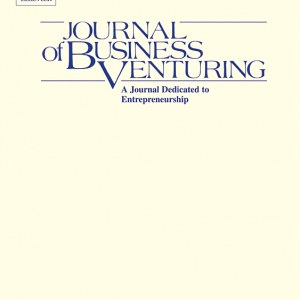
\de Mol\, E., Cardon, \MelissaS.\, \de Jong\, B., Khapova, \SvetlanaN.\ and Elfring, T. (2020). Entrepreneurial passion diversity in new venture teams: An empirical examination of short- and long-term performance implications Journal of Business Venturing, 35(4):1--18.
-
Affiliated author
-
Publication year2020
-
JournalJournal of Business Venturing
Empirical evidence is mounting that passion is an important part of entrepreneurship, contributing to behavior and outcomes for entrepreneurs, employees, and ventures. Yet knowledge of the performance implications of passion within new venture teams is sorely lacking. We examine how both the average level of entrepreneurial passion and the diversity of passion within new venture teams contributes to venture performance in both the short- and long-term. We test our model with multi-source, multi-wave data collected from 107 new venture teams participating in an accelerator program. Our findings indicate that average team passion is not significantly related to performance, but passion diversity, particularly intensity separation, is negatively related to performance. These findings have important implications for the literature on passion, new venture teams, and group affective diversity. Executive summary: While existing studies have substantially improved our understanding of entrepreneurial passion, its sources, and its subsequent impact, insight into this topic remains limited in at least three ways. First, most new ventures are founded and led by teams rather than individuals, yet existing studies predominantly focus on entrepreneurial passion at the individual rather than team level. Second, while there is a prevailing assumption in existing literature that entrepreneurial passion leads to beneficial outcomes consistent with longstanding work in psychology, there is emerging evidence in entrepreneurship that passion may not always be functional and that it can even be dysfunctional. Despite this, we have limited understanding of what types of passion or when or for whom it is dysfunctional. And third, extant work on entrepreneurial passion for individuals and within teams has focused on behavioral or self-report measures of performance (e.g. Cardon and Kirk, 2015; Santos \& Cardon, 2019) as well as venture survival, rather than objective team or firm performance in the short- and long-term. In this paper, we study the influence of team passion on new venture team performance. We draw on theory concerning entrepreneurial passion within venture teams (Cardon et al., 2017) that suggests that different aspects of entrepreneurial passion within teams shape team dynamics and venture outcomes. While generally, theories of passion suggest that entrepreneurial passion is positively related to team outcomes due to the positive emotions it brings about, we find that in teams, the relationships are more complex. While the average level of passion among team members is positively related to team performance when considered alone, this effect is not significant when passion diversity is also considered. Diversity of passion among individual team members has a negative relationship with team performance, including diversity in the level of passion team members experience (intensity separation), as well as diversity in the object of their passion (focus variety). These negatively affect team dynamics due to conflicting emotions and identities among team members associated with passion diversity. We examine these relationships on specific team performance outcomes including evaluation of the business idea in the short-term and venture performance five years after their participation in an accelerator. The sample used in this study includes 107 entrepreneurial teams that were part of an accelerator program in the Netherlands. Teams were evaluated on the quality of their business ideas at the end of the accelerator program and the amount of investment the team had received five years later. Our results provide no support for positive effects of average team passion on the quality of the business ideas and confirm the negative effects of passion intensity separation on the quality of the business idea and the negative effects of passion focus variety on later venture performance. This paper makes several contributions. First, we expand the literature on passion in entrepreneurship, specifically adding to our understanding of passion within new venture teams. More specifically, we contribute to the growing body of evidence concerning potential dysfunctions of passion by uncovering a dysfunctional property of team passion diversity that uniquely manifests itself at the team level of analysis. We contribute to the literature on new venture teams by examining team composition in the form of passion diversity, and its relationship with team performance. Finally, our study extends work on the effects of entrepreneurial passion by looking at objective team performance outcomes in both the short- and long-term. For entrepreneurs, our findings confirm the importance of affect and identity for new venture teams, and specifically our findings indicate that there is a dark side to team passion. While passion is generally positioned as a positive phenomenon, we highlight the negative outcomes that passion can have in the team context. Diversity in the amount of passion team members experience can diminish the quality of the business ideas the team is able to generate in the short-term, while diversity in the focus of team members' passion can diminish the firm's long-term performance. For investors and accelerator communities this research validates the importance of considering entrepreneurial team composition and specifically entrepreneurial passion levels and domains when investing in teams or when supporting venture building.